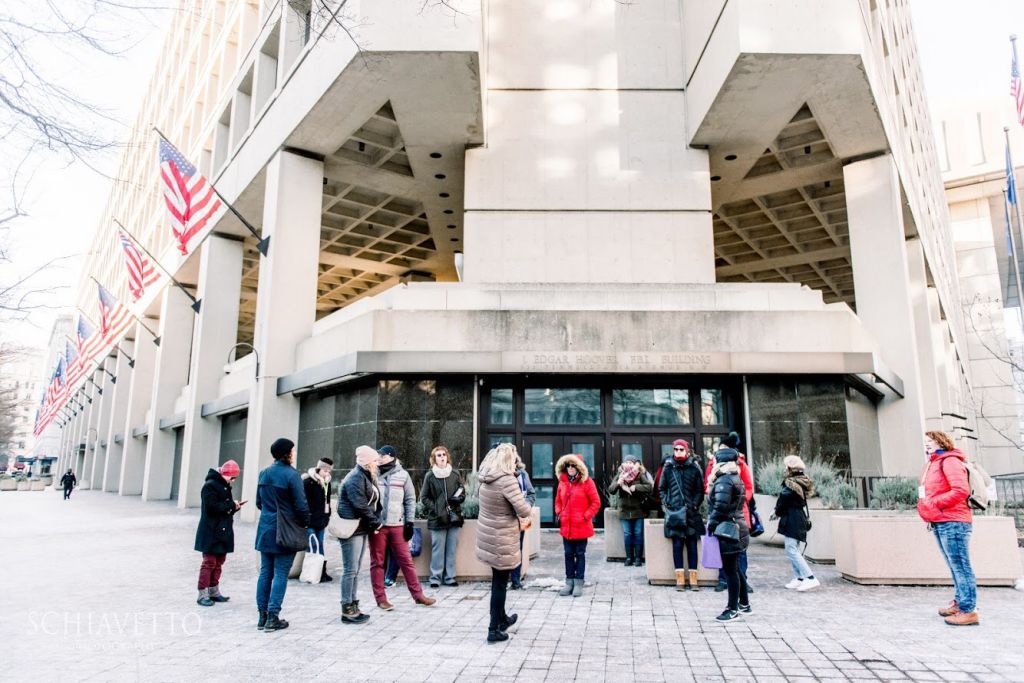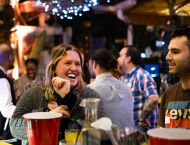Culture
 Tour of Her Own Tour. Photo courtesy of organization.
Tour of Her Own Tour. Photo courtesy of organization.
Tapping Into the International Capital of Feminist Tourism
March 8, 2022 @ 2:00pm
It’s International Women’s Day and there is no doubt in my mind women’s tourism has been on the rise across the globe over the last five years. From feminist “herstory” tours to equal rights marches, women around the world have reclaimed history as a form of activism, and I believe firmly that Washington, D.C. is the global capital of feminist tourism.
Allow me to add some personal context before we dive deep into this. I am a licensed, professional tour guide, public historian and entrepreneur. I am an advocate for the tourism industry and aim to illustrate how it operates. The assumption is that it’s all about museums and monuments, but tourism is more broadly about people moving through public spaces with purpose. Tour guides are street historians and we deeply understand the connection between activism, education, and civics; three values central in the framework of the District of Columbia.
I launched my small business in 2018. A Tour Of Her Own (TOHO) is the first tourism company in Washington, D.C. to focus exclusively on women’s history. I was shocked that “herstory” walking tours were only being offered on a limited basis in the nation’s capital. I’ve come to learn that this was true throughout the world’s most popular cities. I didn’t know it at the time, but women in London, Buenos Aires, and Paris were also building their own feminist tourism businesses around the same time I launched TOHO. Now, we have 21 female tour guide entrepreneurs from all over the world connected in one WhatsApp conversation. We speak different languages and operate in different time zones, but share one similar universal experience — the marginalization of women in history and public spaces.
When Becky Laxton-Bass launched her tour company “Women of London” in 2018, she set out to diversify England’s history to include more working class heroines like nurses and teachers rather than traditional stories of monarchs. In Argentina, “Femi Tours” was created in 2019 by Leticia Garziglia, Lucía Rivero, and Noelia Depaoli to share overlooked Herstory with international tourists in Buenos Aires. In Paris, co-founders Julie Marangé and Cécile Fara launched “Feminists in the City” in 2018 and have since attracted tourists from over 39 different nationalities to explore feminist history in France.
The timing of these entrepreneurial startups has everything to do with global politics and social movements in a world more interconnected than ever. It is proof that the female experience is universal and what affects one woman has an effect on all women. To illustrate why I think D.C. is the heart of the international women’s movement, I offer an example most of us are familiar with. The District hosted the 2017 Women’s March where more than 500,000 activists gathered on the National Mall. Feminism was on full display in reaction to the new presidential administration, but the march extended far beyond our country’s borders. According to the Washington Post, there were 261 sister marches taking place across all seven continents. What started as a uniquely American protest quickly became a global wave. The Women’s March hosted in Washington, D.C. ignited feminist movements in all four corners of the world, in support of equal pay, reproductive rights, bodily autonomy and consent, maternal healthcare, racial justice, disability rights, sexual identity and more. With time, the women’s movement has manifested to become more tangible and more dynamic in D.C. and beyond.
In 2020, we celebrated the opening of Hotel Zena in Logan Circle, a female-empowerment hotel designed by Andrea Sheehan, a fierce feminist and social entrepreneur determined to reframe the travel experience. There is no other city in the world where visitors can walk into a hotel lobby and admire a larger than life portrait of Ruth Bader Ginsburg made of tampons. The nation’s capital is rich in hospitality. D.C. is one of only four cities in the USA to host a Michelin guide and women like Rose Previte of one-star Maydan are leading the way as restaurateurs and executive chefs. Creative culture in the district is one-of-a-kind. The National Museum of Women in the Arts is the first museum in the world solely dedicated to championing women through the arts and it’s only a matter of time until the National Women’s History Museum moves to a brick and mortar in the city.
My experience as a tourism professional has taught me that with activism must come education. I questioned how our society would be different if we had ever really learned women’s history in our elementary school years, a campaign currently being led by Remedial Herstory. I think we surely would be more aware today of how women are massively underrepresented in our mainstream narratives. It occurred to me in 2017, that thousands of feminists were marching through public spaces that primarily glorified men and patriarchal history, with monuments to presidents and war generals.
Imagine how people might move through cities more mindfully if instead of men on horses, they marched past statues of moms carrying babies and girls holding stethoscopes. I wondered if the population would vote more often if we collectively understood the historical trauma, pain, and violence endured by suffragists fighting for women’s access to the ballot box. Would we trust women to lead our countries and promote women to run our companies if we knew that feminists were the first group to ever picket the White House and march down Pennsylvania Avenue over 100 years ago? Women’s contributions are very much the foundation of society. I can’t fully explain how they were erased over time, but I do have the opportunity to acknowledge the feminists working to change that today.
The heart and soul of global women’s tourism is nestled right here in Washington, D.C., the capital city of the United States of America. I am not only privileged to participate on the front lines of the movement, but it’s an absolute pleasure to work alongside my colleagues in tourism who are pushing the boundaries with me. On International Women’s Day, I honor them with great respect; my co-author Rebecca Grawl and photographer Cynthia Schiavetto Staliunas who together developed the first women’s history book in the entire international series published by Emons Verlag; “111 Places in Women’s History in Washington, DC That You Must Not Miss” is a tribute to our city.
Today I honor professional tour director Meghan Hanson who serves on the board of the Guild of Professional Tour Guides of Washington, D.C. and I also praise Ella Schiralli, TOHO’s Director of Community Engagement. Tour guides Lindsey Horn, Buck Johnson, Lauri Williamson and Canden Arciniega have all committed to sharing their knowledge of women’s history with TOHO at the intersection of military, civil rights and local neighborhoods. Most importantly on International Women’s Day, I invite everyone to honor our foremothers and move their stories away from the margins and into the mainstream.
Enjoy this piece? Consider becoming a member for access to our premium digital content. Support local journalism and start your membership today.







